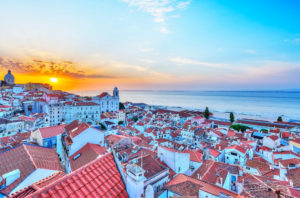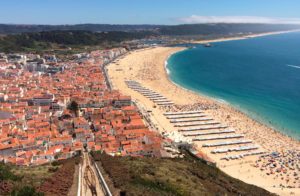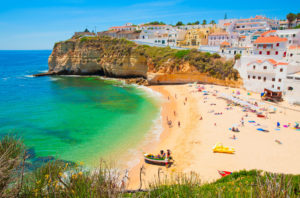Golden Visa In Portugal: Requirements
a) Introduction
The so-called “Golden Visas” are not visas as such. They are residence permits allowing their holders the right to enter and stay in Portugal for investment purposes.
The correct designation is in fact given by law: residence permit for investment activity (ARI).
This residence permit is awarded to anyone who is not a citizen of the European Union or the Schengen zone, nor under its control, meeting certain criteria linked to investment, the purchase of real estate and/or the creation of jobs.
Taxes and fees are due when applying for or renewing a residence permit and all the documents confirming the respect of the award conditions must be prepared in advance.
The ARI is initially granted for a period of one year, renewable for periods of two years if the award conditions remain in place, particularly in terms of investment.
After an initial five years, a permanent residence permit can be granted, or the investor can continue to ask for the renewal of the ARI. It is no longer necessary to maintain the investment award conditions once a permanent residence permit is obtained.
It is also worth noting that a foreigner legally resident in Portugal for six years can apply for Portuguese citizenship.
b) Benefits of the ARI or Golden Visa
- No requirement for a residence visa to enter and stay in Portugal;
- Stay and work in Portugal while maintaining a residence in another country;
- Travel in the Schengen zone without a visa;
- Benefit from the family reunification right set out below;
- Access to a permanent residence permit (after 5 years and in accordance with the legislation in force);
- Access to Portuguese nationality (after 6 years and in accordance with the legislation in force).
c) Beneficiaries of the ARI or Golden Visa
Any national from a third country exercising an investment activity, personally or via a business established in Portugal or in any other European Union country, who is permanently established in Portugal, and who fulfils the quantitative requirements and the time condition laid out in the applicable legislation:
d) Quantitative requirements to apply for the ARI or Golden Visa
With regards to quantitative requirements, at least one of the following criteria must be met on the Portuguese territory:
- The transfer of a capital of at least 1 million euros;
- The creation of at least 10 jobs;
- The acquisition of property(ies) to a value equal or greater to 500,000 euros;
- The purchase of property(ies) built for at least 30 years or located in an urban rehabilitation area, subject to rehabilitation work, for a total value of 350,000 euros minimum;
- The transfer of capital of at least 350,000 euros, for the purpose of financing investigative activities conducted by public or private scientific research institutions integrated in the national scientific and technological system;
- The transfer of capital of at least 250,000 euros, for the purpose of investing or supporting art production, the recovery or maintenance of the national cultural heritage, as provided for by law;
- The transfer of capital of at least 500,000 euros, for the purpose of purchasing participation units in investment funds or venture capital aiming to capitalize small and medium-sized businesses presenting a viable capitalization plan to that effect.
It is worth noting that, in some cases, the minimum investment amount may be reduced by 20% when the activities in question are developed in areas considered to be of low population density.
e) Minimum time conditions for investment activity
The investment must be kept for a period of five (5) years from the date the residence permit is granted. At the end of this period, maintaining the investment is no longer required.
f) Duty of care and documentation requirements
Anyone interested in an IRA must cumulatively meet the following conditions:
- Absence of a conviction for a crime that is punishable in Portugal by a term of imprisonment of more than a year;
- No ban from entry into the national territory because of a deportation measure;
- Not being listed in the Schengen information system;
- Not being listed in the integrated SEF (border service) system for non-admission.
Anyone interested in an IRA must cumulatively meet the following conditions in terms of documentation:
- Hold a valid passport;
- Hold a Schengen visa, if appropriate, and regularize his/her situation with the SEF within 90 days from the date of first entry in Portugal;
- Copy of the criminal record from the country of origin or the country of residence for more than a year, duly translated into Portuguese, and certified by the Portuguese Consulate of the country of issue or by apostille, in accordance with The Hague Convention;
- Statement allowing the authorities to consult Portuguese police records;
- Recent no-debt certificate issued by the Department of Finance (Autoridade Tributária e Aduaneira) and social security (in Portugal);
- Sworn declaration by the applicant undertaking to respect the obligations for the exercise of the investment activity in the national territory;
- Proof of mutual insurance;
- Proof of payment of the ARI application processing fee (€514.80)
g) Application for the ARI or Golden Visa
The interested individuals can apply in one of the following ways:
- In person, via the directorates and regional delegations of the SEF in Portugal. Interested individuals can apply for ARI through the direction or regional delegation of the SEF of their place of residence, within 90 days from the date of their first entry in Portugal. The application must include all the receipts for the investment completed and proof of payment of the processing fee (€514.80).
- In person, via an overseas diplomatic or consular Portuguese post, where the application must be submitted with proof of the investment made and the payment of the processing fee €514.80).
h) Timescale for granting or renewing the ARI or Golden Visa
If the application is complete, the SEF will make a decision within a maximum period of 90 days.
i) Costs for granting and renewing the ARI or Golden Visa
- If an application for ARI is accepted, the investor has to pay a tax of €5,147.80.
- If an application for the renewal of ARI is accepted, the investor has to pay a tax of €2,573.90.
(j) Obligation of residence on the national territory
When he submits his application for ARI, the applicant is not required to be resident in Portugal for a minimum period. He simply needs to present himself at the SEF on the agreed date to provide some personal elements (fingerprints, among others).
Once the residence permit granted, the holder must respect the obligations of residence on the national territory listed below:
- During the 1st year of the issuance of the visa, he must stay on Portuguese territory for 7 days, consecutive or not;
- During the 1st renewal of the visa (2 years), he must stay on Portuguese territory for 14 days, consecutive or not;
- During the 2nd visa renewal (2 years) and the following renewals, he must stay on Portuguese territory for 14 days, consecutive or not.
If the investor chooses to become a permanent resident at the end of 5 years, he may not be absent from the country for periods of more than:
- 24 consecutive months;
- 30 months in total over 3 years.
The same conditions apply to each of the members of the reunified household. The proof of this permanent presence on the national territory can be provided in various ways (plane tickets, hotels, food bills, for example).
k) Implementation date and validity of the special ARI or Golden Visa regime
The regime has been in place since October 8, 2012, and for an indefinite period. Given the economic situation, it is impossible to predict the end or a restriction of this regime.
l) Members of the family of the ARI or Golden Visa holder eligible to benefit from the regime – family reunification and respective costs
The following people are considered members of the family in the conventional sense:
- the spouse;
- dependent children, minor or declared incapable, cared for by the couple or one of the spouses;
– minors adopted by the applicant if the latter is not married, or by the applicant or his or her spouse, following a judgement by the competent authority in the country of origin, provided the law of this country grants adopted children the same rights and duties as those of natural filiation and if the judgement is recognized in Portugal;
- dependent adult children of the couple or one of the spouses who are single and students;
- direct line and first-degree ascendants of the resident or the spouse, provided they are dependents;
- minor brothers and sisters, provided they are placed under the supervision of the resident, in accordance with a decision made by the competent authority of the country of origin, duly recognized by Portugal.
The following people are considered as cohabiting members of the family:
- a partner who has, on the national territory or abroad, a cohabiting relationship with the foreign citizen, duly proved in accordance with the law;
- single unmarried minor or declared incapable children, including adopted children of the common-law partner, if they have been entrusted to them by court order.
- Family reunification should be requested from a branch or regional delegation of the border service (SEF) of the place of residence.
- The application for family reunification may be filed when applying for the ARI or subsequently, at the convenience of the investor.
Whatever the case, it is associated with the decision made on the request for the ARI.
This way, with the same investment, it is possible to obtain an IRA for all the members taking part in the family reunification.
- If the application for family reunification filed under the ARI regime is accepted, the investor must pay the sum of €5,147.80 for each member of the family; this sum is €2,573.90 for each renewal.
m) Obtaining the Portuguese citizenship
In accordance with nationality law, individuals residing on Portuguese territory for more than 6 years can get Portuguese citizenship by naturalization. In addition to this requirement, it is also necessary that the applicant be major, have sufficient knowledge of the Portuguese language, and that he/she has not been convicted in a final non-appealable judgement for a crime punishable by an imprisonment of 3 years or more according to Portuguese law.
This guide explains requirements for a Portuguese Golden Visa, plus details on Portugal’s Golden Visa Program and Portuguese Citizenship by Investment.
Tagus Property
OUR REAL ESTATE AGENCIES IN PORTUGAL
FIND A PROPERTY HUNTER IN PORTUGAL BY REGION

Property Finder in Lisbon
Contact our property finders in the Lisbon region to discuss your real estate project.
Read more
Real Estate Hunter Silver Coast
Use a hunter to find a house or apartment around Lisbon region.
Read more
Property Hunter Algarve
Contact a property hunter to find your villa in the Algarve or your apartment by the sea in Portugal.
Read more